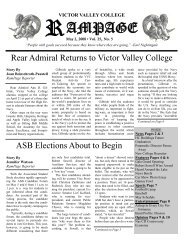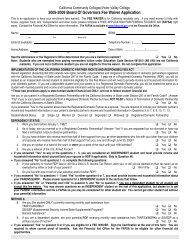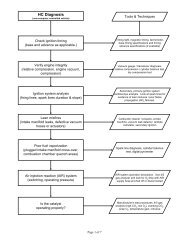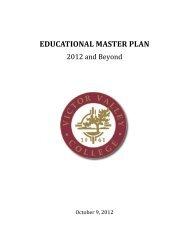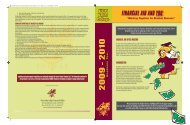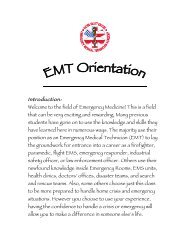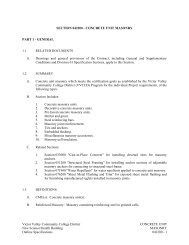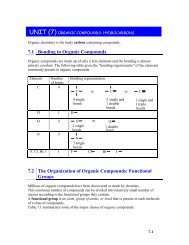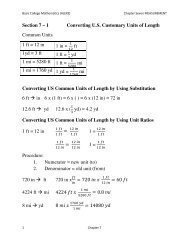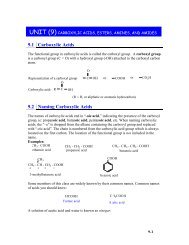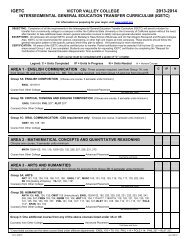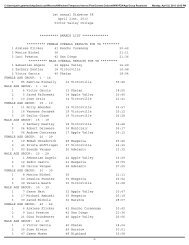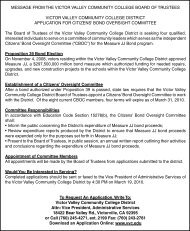Download - Victor Valley College
Download - Victor Valley College
Download - Victor Valley College
You also want an ePaper? Increase the reach of your titles
YUMPU automatically turns print PDFs into web optimized ePapers that Google loves.
PROGRAMS / COURSE DESCRIPTION<br />
ECONOMICS • EDUCATION<br />
ECONOMICS<br />
Economists study how society can best use resources<br />
such as land, raw materials, capital, and labor. They<br />
analyze the relationship between the supply of goods<br />
and services and the demand as well as how these<br />
goods and services are produced, distributed, and<br />
consumed. Some economists work on public issues<br />
such as the control of inflation, business cycles, unemployment,<br />
wage, tax, and tariff policies. Others<br />
collect, analyze, and interpret data on a wide variety of<br />
economic problems, develop theories to explain causes<br />
of these problems, and identify possible solutions.<br />
Economics provides both a general academic<br />
experience and professional preparation. The program<br />
emphasizes economic analysis, institutions, and policy<br />
in America, regional, and urban settings. Economics is<br />
designed to facilitate the students’ matriculation to the<br />
four-year college or to provide an understanding of the<br />
economic world in which we live. Key concepts and<br />
methodology for analysis are emphasized.<br />
Career Opportunities<br />
Budget Analyst<br />
Business Analyst<br />
Business Forecaster<br />
Commodity Economist<br />
Commodity Price Forecaster<br />
Economic Analyst<br />
Economic Forecaster<br />
Economist<br />
Industrial Relations Specialist<br />
Investment Analyst<br />
Faculty<br />
Peter Allan<br />
Henry Young<br />
Degrees and Certificates Awarded<br />
Associate in Arts, Liberal Arts<br />
Associate Degree<br />
No Associate degree is offered with a major in<br />
Economics. Economics courses may be used to fulfill<br />
requirements for an Associate in Arts degree with a<br />
major in Liberal Arts. See Liberal Arts for degree<br />
requirements for this major.<br />
Transfer<br />
To pursue a bachelor’s degree in this field, here are<br />
some schools that have programs that might interest<br />
you. For the most up-to-date information on these<br />
programs and others, visit www.assist.org. Please stop<br />
by the Transfer Center in Building 55 or make an<br />
appointment with a counselor if you have questions.<br />
• California State University, San Bernardino<br />
Economics major<br />
• University of California, Riverside<br />
Economics major<br />
ECONOMICS COURSES<br />
ECON 101 PRINCIPLES OF ECONOMICS: MACRO<br />
Units: 3.0 - 48-54 hours lecture. (Prerequisite: Math 90<br />
or higher with a grade “C” or better).<br />
Introduction to economic theory and analysis with<br />
emphasis on fiscal and monetary policy, capitalism,<br />
national income, employment, money, economic<br />
stability, economic growth and achievements<br />
emphasizing the macro-economic approach. The<br />
purpose is to provide students with an introduction into<br />
major issues facing the world economies, exposing<br />
students to the methods that economists use to study<br />
and solve those issues and economic policy problems of<br />
the 21st century.<br />
ECON 102 PRINCIPLES OF ECONOMICS: MICRO<br />
Units: 3.0 - 48-54 hours lecture. CSU, UC.<br />
(Prerequisite: Math 90 or higher with a grade “C” or<br />
better).)<br />
Introduction to economic theory and analysis with<br />
emphasis on basic concepts, the economics of business<br />
organizations and resource allocation, domestic,<br />
international, and world economics. Emphasizes the<br />
micro-economic approach.<br />
ECON 128 SPECIAL TOPICS<br />
See Special Topics listing (Variable units). CSU<br />
ECON 129 INDEPENDENT STUDY<br />
See Independent Study listing (1-3 units). CSU<br />
EDUCATION<br />
The Department of Education and Educational<br />
Technology at <strong>Victor</strong> <strong>Valley</strong> <strong>College</strong> offers certificate<br />
programs for transfer into teaching credential programs<br />
offered at accredited four-year colleges. These<br />
preparatory courses may transfer to Education and<br />
Educational Technology majors when and where<br />
articulation agreements exist. Education is the career<br />
field for those individuals who desire to teach in<br />
elementary and secondary schools, as well as in<br />
colleges and professional education. This field of study<br />
prepares students to participate as teachers and<br />
learning facilitators. Graduates in this field—bachelor’s<br />
degree and postgraduate study required —qualify for a<br />
variety of positions including teaching at the elementary,<br />
secondary, and college levels. Education remains on<br />
the national list of growing occupations.<br />
To obtain a California teaching credential, students must<br />
follow a five-year program by first pursuing a four-year<br />
bachelor’s degree and then completing a fifth year<br />
teaching credential program in which they complete<br />
mostly education courses, including student teaching.<br />
194 2012-2013 <strong>Victor</strong> <strong>Valley</strong> <strong>College</strong> Catalog



